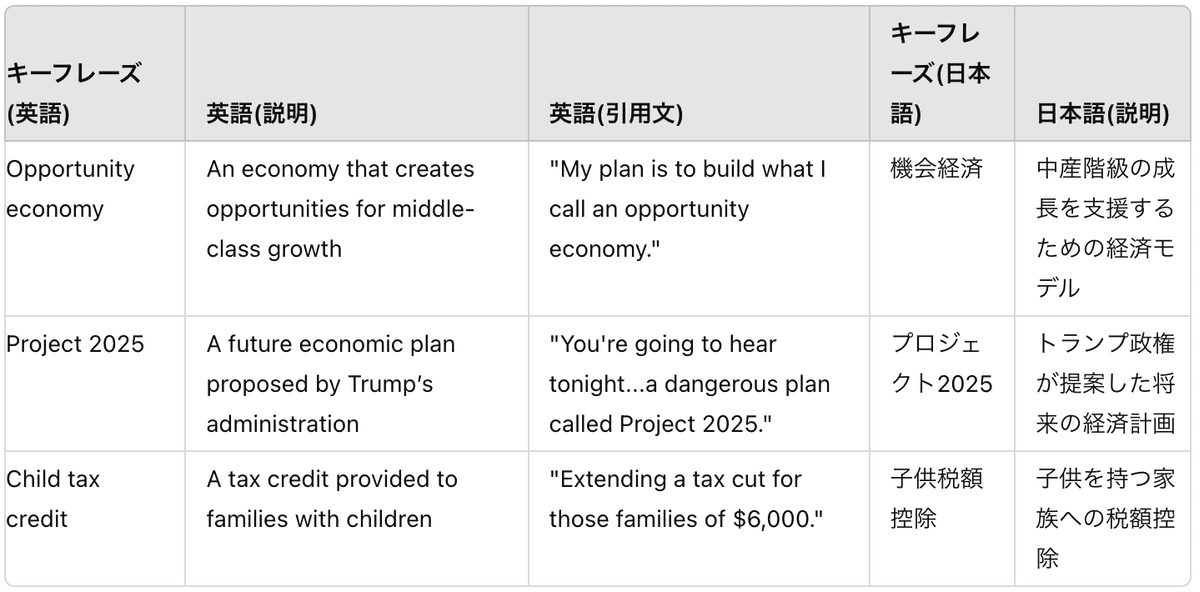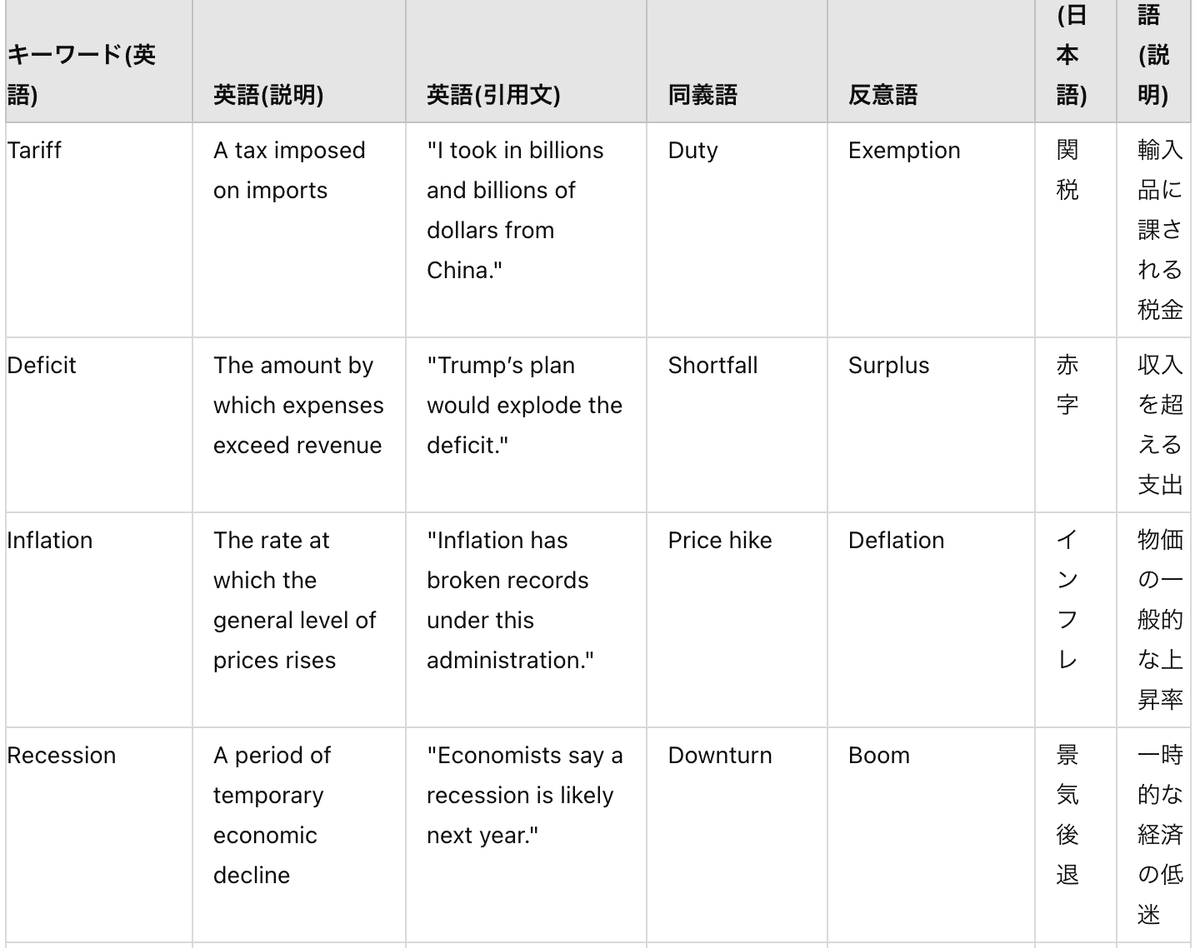
「米大統領選討論会」で英語を学ぶ〜AIとのインタラクティブ・ラーニング例〜
動画
はじめに
AIとのインタラクティブ・ラーニングでは、自分が興味のあるコンテンツを利用して英語を学びます。
先生や友達に評価(けなされたり、ほめられたり)されないので、純粋に、自分の興味を深めることができます。
本記事では、「米大統領選討論会」を利用して英語を学ぶ具体例を提案します。
本記事では、たまたま「米大統領選討論会」なだけで、学ぶコンテンツは、映画でもアニメでも漫画でも何でも構いません。自分の興味のあるコンテンツに置き換えて読み替えてください。
自分オリジナルの理解度チェックや自分オリジナルの英単語集を作って、楽しく学んで、自分の興味を深めましょう!
AIとのインタラクティブ・ラーニングの実践については、以下にまとめています。(理論については、追って記事にします。)
1. 基本情報
1.1. 英語
What: A presidential debate between Vice President Kamala Harris and former President Donald Trump for the 2024 U.S. election.
When: September 11, 2024.
Where: Philadelphia, at the National Constitution Center.
Who: Kamala Harris, Donald Trump, moderators David Muir and Linsey Davis.
Why: The debate was part of the 2024 U.S. presidential election, aimed at discussing key issues such as the economy, immigration, and abortion rights.
How: The debate followed a formal structure with timed responses from each candidate, focusing on issues voters care about.
1.2. 日本語
内容 (What): 2024年のアメリカ大統領選挙に向けた、カマラ・ハリス副大統領とドナルド・トランプ元大統領による討論会。
日時 (When): 2024年9月11日。
場所 (Where): フィラデルフィア、ナショナル・コンスティチューション・センター。
参加者 (Who): カマラ・ハリス、ドナルド・トランプ、司会者デイビッド・ミュアーとリンジー・デイビス。
目的 (Why): 2024年のアメリカ大統領選挙の一環として、経済、移民、妊娠中絶の権利など、重要な問題について議論するため。
形式 (How): 討論は正式な構造に従い、各候補者が制限時間内で回答を行い、有権者が関心を持つ問題に焦点を当てた。
2. 理解度チェック
2.1. 初級
問題: Where did the Harris-Trump debate take place?
Washington, D.C.
New York City
Philadelphia
Boston
解答: 3. Philadelphia
解説: The debate occurred in Philadelphia, at the National Constitution Center. The other options are incorrect locations.
2.2.中級
問題: What is one of Kamala Harris's economic plans mentioned during the debate?
A national sales tax
Extending a tax cut for young families
Increasing tariffs on foreign imports
Decreasing unemployment benefits
解答: 2. Extending a tax cut for young families
解説: Harris mentioned extending a tax cut for young families of $6,000. The other options reflect policies not discussed by Harris.
2.3. 上級
問題: What reason did Trump give for maintaining tariffs during the debate?
To reduce domestic inflation
To recover billions from foreign countries like China
To impose a national sales tax
To lower middle-class taxes
解答: 2. To recover billions from foreign countries like China
解説: Trump argued that tariffs were imposed to recover billions from countries like China. He dismissed the idea of a national sales tax, making the other options incorrect.
3. 3行要約
3.1. 英語
Kamala Harris and Donald Trump debated key issues for the 2024 U.S. presidential election.
The debate covered topics such as the economy, immigration, and healthcare.
Harris emphasized her middle-class support plan, while Trump defended his tariffs and economic policies.
3.2. 日本語
カマラ・ハリスとドナルド・トランプが2024年の大統領選挙に向けて討論を行いました。
討論では、経済、移民、医療などの重要な問題が議論されました。
ハリスは中産階級への支援計画を強調し、トランプは関税と経済政策を擁護しました。

4. キーワード・キーフレーズ・キーセンテンス
4.1. キーワード

4.2. キーフレーズ

4.3. キーセンテンス

5. 英単語集10



6. 理解度チェック(続き)
6.1. 初級レベル
問題1: Kamala Harris stated that her economic plan focuses on which group of people?
Billionaires
Large corporations
Middle-class and working people
Foreign investors
解答: 3. Middle-class and working people
解説: 正答は「Middle-class and working people」です。ハリス氏は、彼女の経済計画が中産階級と労働者層を支援することに重点を置いていると述べました。他の選択肢(1, 2, 4)は討論内容に含まれていません。
問題2: Donald Trump argues that which country will pay tariffs to the U.S.?
Japan
China
Canada
Mexico
回答: 2. China
解説: 正答は「China」です。トランプ氏は、中国がアメリカに多額の関税を支払うと主張しました。他の選択肢は討論で取り上げられていません。
問題3: According to Harris, how much is the child tax credit she plans to extend?
$2,000
$3,000
$6,000
$10,000
解答: 3. $6,000
解説: 正答は「$6,000」です。ハリス氏は、若い家族を支援するために$6,000の子供税額控除を延長すると述べました。その他の金額は討論で言及されていません。
問題4: According to Donald Trump, what is the cause of the current economic problems in the U.S.?
Low taxes
Tariffs
Inflation
Immigration
回答: 3. Inflation
解説: 正答は「Inflation」です。トランプ氏は、アメリカの現在の経済問題の原因としてインフレを挙げました。他の選択肢(1, 2, 4)は討論で異なる文脈で述べられましたが、主要な焦点ではありませんでした。
6.3. 中級レベル
問題5: What does Kamala Harris propose as part of her economic plan for small businesses?
A $50,000 tax deduction
Free loans for startups
A $10,000 grant
A 10% tax increase
解答:
A $50,000 tax deduction
解説: 正答は「A $50,000 tax deduction」です。ハリス氏は小規模企業のために$50,000の税控除を提案しました。他の選択肢(2, 3, 4)は討論に出ていません。
問題6: According to Donald Trump, how did his tariffs affect China?
China stopped trading with the U.S.
China paid billions in tariffs to the U.S.
China retaliated with higher tariffs
The tariffs had no effect
解答: 2. China paid billions in tariffs to the U.S.
解説: 正答は「China paid billions in tariffs to the U.S.」です。トランプ氏は、中国がアメリカに多額の関税を支払ったと主張しました。その他の選択肢(1, 3, 4)は討論内容に合致しません。
問題7: What is Kamala Harris’s stance on abortion rights?
She supports a national abortion ban
She supports the reinstatement of Roe v. Wade
She believes the government should stay out of abortion issues
She opposes any restrictions on abortion
解答: 2. She supports the reinstatement of Roe v. Wade
解説: 正答は「She supports the reinstatement of Roe v. Wade」です。ハリス氏は、Roe v. Wadeの保護を復活させることを支持しています。他の選択肢(1, 3, 4)は彼女の立場に反しており、不正解です。
6.3. 上級レベル
問題8: What did Donald Trump claim about Kamala Harris’s connection to "Project 2025"?
Harris is one of the authors of Project 2025
Harris denied any knowledge of Project 2025
Trump stated he has no connection to Project 2025
Harris wants to implement Project 2025 if elected
解答: 3. Trump stated he has no connection to Project 2025
解説: 正答は「Trump stated he has no connection to Project 2025」です。トランプ氏は、彼がProject 2025と関係がないと述べました。他の選択肢(1, 2, 4)は討論で述べられていません。
問題9: How does Kamala Harris plan to address housing affordability issues in her economic plan?
Increasing property taxes on large estates
Expanding rent control laws nationwide
Providing down payment assistance for first-time home buyers
Cutting funding for housing development programs
解答: 3. Providing down payment assistance for first-time home buyers
解説: 正答は「Providing down payment assistance for first-time home buyers」です。ハリス氏は、初めて家を購入する人に対して頭金支援を提供する計画を提案しました。他の選択肢(1, 2, 4)は討論で言及されていません。
問題10: What does Donald Trump claim is the main reason for the record high inflation?
The tariffs he imposed
The economic policies of the Biden administration
Global oil prices
Overregulation of businesses
回答: 2. The economic policies of the Biden administration
解説: 正答は「The economic policies of the Biden administration」です。トランプ氏は、バイデン政権の経済政策がインフレの主な原因だと主張しました。他の選択肢(1, 3, 4)は言及されていますが、インフレの主要な理由ではありません。
【参考】要約(詳細)
英語
The Harris-Trump presidential debate was a significant political event that highlighted the key differences between Vice President Kamala Harris and former President Donald Trump. The debate, moderated by David Muir and Linsey Davis, covered various topics, including the economy, immigration, abortion rights, and foreign policy. Both candidates expressed their perspectives on these issues, often contrasting sharply in their policy approaches and visions for America’s future.
1. The Economy: The debate began with a focus on the economy, which both candidates acknowledged as a crucial issue for voters. Kamala Harris emphasized her plan to support the middle class and working families, introducing an "opportunity economy." She highlighted policies such as a $6,000 child tax credit for young families, housing affordability initiatives, and support for small businesses. Harris proposed a $50,000 tax deduction for startup businesses, emphasizing her commitment to building a strong economic foundation for all Americans. In contrast, Donald Trump defended his economic record, denying Harris’s claims about a proposed sales tax. He argued that his tariffs on other countries, particularly China, would lead to significant revenue for the U.S. without burdening American consumers. Trump blamed the Biden administration's policies for the current inflation and economic challenges, asserting that his approach to tariffs had kept inflation under control during his presidency.
2. Immigration: Immigration was another contentious topic during the debate. Harris criticized Trump’s handling of immigration during his presidency, particularly his policies that led to family separations at the border and the construction of a border wall. She advocated for a more compassionate approach, focusing on addressing the root causes of migration and supporting legal pathways to citizenship. Harris also pointed to bipartisan border security measures that Trump opposed. Trump, on the other hand, emphasized the need for strict immigration control, claiming that under the Biden administration, millions of people, including criminals, were pouring into the country illegally. He proposed the largest domestic deportation operation in U.S. history, involving the National Guard and local police. Trump argued that Harris’s lenient immigration policies were damaging the country and causing widespread crime and economic harm.
3. Abortion Rights: Abortion rights were another critical issue discussed in the debate. Kamala Harris reaffirmed her commitment to protecting reproductive rights, stating that she would sign a bill to restore the protections of Roe v. Wade if Congress passed such legislation. Harris condemned the Trump administration for appointing Supreme Court justices who overturned Roe v. Wade, resulting in restrictive abortion laws in many states. She highlighted the impact these laws had on women, particularly those who had been victims of rape or incest. Trump responded by defending his role in appointing the justices who overturned Roe v. Wade, emphasizing that the issue had now been returned to the states, allowing them to decide on abortion laws. He denied any plans to sign a national abortion ban and stated that his administration had always supported exceptions for rape, incest, and the life of the mother.
4. Foreign Policy and National Security: The debate also touched on foreign policy, with Trump criticizing the Biden administration’s handling of global affairs, particularly the U.S. withdrawal from Afghanistan and the ongoing conflict in Ukraine. Trump claimed that under his leadership, the U.S. had been respected on the global stage, citing his relationships with world leaders such as Vladimir Putin and Kim Jong Un as evidence of his foreign policy success. He argued that Biden’s policies had weakened America’s position globally and emboldened adversaries like Russia and China. Harris, in response, defended the Biden administration’s foreign policy, particularly its support for Ukraine in its fight against Russian aggression. She emphasized the importance of defending democracy and maintaining strong alliances with NATO and other international partners. Harris also criticized Trump’s admiration for authoritarian leaders, accusing him of undermining America’s democratic values.
5. Conclusion and Final Remarks: The debate concluded with both candidates making final appeals to voters. Harris emphasized her vision for a united America, one where the government works for the people, particularly the middle class and working families. She reiterated her commitment to reproductive rights, economic opportunity, and compassionate immigration policies. Trump, in contrast, painted a bleak picture of America under the Biden administration, focusing on economic struggles, rising crime, and weakened foreign relations. He promised to restore America’s greatness, rebuild the economy, and implement stricter immigration and national security measures.
The debate highlighted the stark contrasts between Harris and Trump, with Harris focusing on progressive policies aimed at economic justice, social equality, and global cooperation, while Trump emphasized a return to his previous policies of economic nationalism, strict immigration enforcement, and assertive foreign policy. Both candidates aimed to appeal to their respective voter bases, setting the stage for a highly competitive presidential race.
日本語
ハリス対トランプ大統領討論会は、カマラ・ハリス副大統領とドナルド・トランプ前大統領の政策の違いを際立たせた重要な政治イベントでした。デイビッド・ミュアーとリンジー・デイビスが司会を務め、討論会では経済、移民、妊娠中絶の権利、外交政策など多岐にわたるトピックが議論されました。両候補者はこれらの問題についての見解を表明し、政策のアプローチとアメリカの将来に対するビジョンが大きく異なっていました。
1. 経済: 討論会は経済に焦点を当てて始まりました。両候補者とも、有権者にとって重要な問題として経済を認めました。カマラ・ハリスは中産階級や労働者家庭を支援する計画として「機会経済」を強調し、若い家庭への6,000ドルの子供税額控除や、住宅の手頃な価格を維持するための取り組み、小規模企業支援の政策を紹介しました。彼女はスタートアップ企業に対して50,000ドルの税控除を提案し、アメリカ全体の経済基盤を強化することを目指しました。これに対し、ドナルド・トランプは自身の経済実績を擁護し、ハリスの主張する売上税案を否定しました。トランプは中国への関税がアメリカに多額の収入をもたらすと主張し、消費者に負担をかけないと述べました。トランプは、バイデン政権の政策が現在のインフレと経済問題の原因であると非難し、自身の関税アプローチがインフレを抑制したと強調しました。
2. 移民: 移民問題も討論の中で重要な議題となりました。ハリスは、トランプ政権の移民政策、特に家族分離政策や国境の壁建設を批判しました。彼女は、移民の根本的な原因に取り組むことや合法的な市民権取得の道を支援することに焦点を当て、より人道的なアプローチを提案しました。また、トランプが反対した超党派の国境安全保障対策にも言及しました。一方、トランプは厳格な移民管理の必要性を強調し、バイデン政権下では数百万人の犯罪者を含む人々が違法に国内に流入していると主張しました。トランプは、史上最大の国内強制送還作戦を提案し、国境警備隊や地元警察を動員すると述べました。彼は、ハリスの寛容な移民政策がアメリカに被害を与え、犯罪や経済的損害を引き起こしていると非難しました。
3. 妊娠中絶の権利: 妊娠中絶の権利も討論で重要なテーマでした。ハリスは、妊娠中絶の権利を保護することに対する強いコミットメントを再確認し、議会がそのような法律を可決した場合、Roe v. Wadeの保護を復活させる法案に署名する意向を表明しました。彼女は、トランプ政権が指名した最高裁判事がRoe v. Wadeを覆し、多くの州で厳しい妊娠中絶法をもたらしたことを非難しました。トランプはこれに対し、Roe v. Wadeを覆した判事の指名を擁護し、妊娠中絶の問題が州に委ねられたことを強調しました。彼は、全国的な妊娠中絶禁止令に署名する予定はないとし、レイプ、近親相姦、母体の生命に対する例外を常に支持してきたと述べました。
4. 外交政策と国家安全保障: 討論では外交政策にも触れられ、トランプはアフガニスタンからの撤退やウクライナの紛争など、バイデン政権の外交政策を批判しました。
